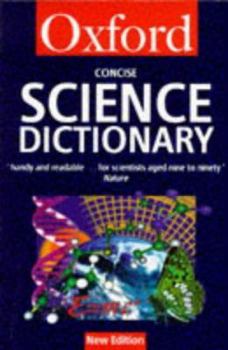Concise Science Dictionary
Select Format
Select Condition 
Book Overview
Written in a clear, explanatory style, the new Third Edition of the Concise Science Dictionary contains more than 8,500 entries relating to physics, chemistry, biology (including human biology), the earth sciences, and astronomy, as well as terms that are commonly encountered in mathematics and computer science. This new edition has been expanded to reflect recent advances molecular biology, genetics and genetic engineering, particle physics, cosmology,...
Format:Paperback
Language:English
ISBN:0192800337
ISBN13:9780192800336
Release Date:August 1996
Publisher:Oxford University Press, USA
Length:800 Pages
Weight:1.20 lbs.
Dimensions:1.7" x 5.1" x 7.6"
Customer Reviews
4 ratings
very helpful!
Published by Thriftbooks.com User , 14 years ago
If you are in college, and majoring in science this is a must have! Good condition extremely helpful & very cheap!
Dictionary of Science review
Published by Thriftbooks.com User , 15 years ago
I'm a nursing student, but am taking a lot of science classes. I needed a dictionary of scientific terms, not of medical terminology, and I can't think of a better one than the Oxford Dictionary of Science; a trusted name and, so far, everything I've needed to look up has been in there. How did I live without it?
I like the OXFord series. Well put together.
Published by Thriftbooks.com User , 16 years ago
I have many of them and my favorite. Dictionary of Economics. In summary a scale that defines savings and interest rates. What moves them expenditure. And what brings it back to balance. The hand of time!
The best choice for those who read a lot of popular science
Published by Thriftbooks.com User , 20 years ago
This is a relatively inexpensive, concise, and handy dictionary of science. It is an updated version of the Concise Science Dictionary originally published by the Oxford University Press in 1984. This, the latest edition, is from 1999. It is aimed at professionals and an educated public who want a quick reference to terms in fields other than their own. Unlike science dictionaries found on the reference shelves of libraries, this book is small enough to fit into a knapsack. As with all specialized dictionaries the task for editors is to decide what to leave in and what to leave out, and how technical to get. The people at Oxford University Press, one of the preeminent publishers of reference books in the world, have tried to eschew "unnecessary scientific jargon" while "always bearing in mind the needs of the readers" (from the Preface). Nonetheless, many of the entries are highly technical, having been written by experts. Clearly the editors have decided to err on the side of technical precision rather than anything resembling a dumbing down. The entry on "optical activity" for example is a mini essay of about 400 words adorned with a drawing of the D-, L-, and meso-forms of the isomers of tartaric acid along with several cross references to related terms in the dictionary. A two-page boxed entry on "El Nino" however is written in language easily accessible to the average high school graduate, as are many other entries including over 160 mini biographies of important scientists. I also use The American Heritage Dictionary of Science, another handy (as opposed to comprehensive) reference and would like to make a quick comparison. The Heritage dictionary is a hardcover and contains noticeably more entries (16,000+ to perhaps 10,000 to 12,000 for the Oxford). However the Heritage hasn't been updated since the edition of 1988. Of course a lot has happened in science since then, which is why I purchased the Oxford paperback. The Heritage also uses the entries words or phrases in sentences, usually quoting some scientist whereas the Oxford does not bother. The Heritage also gives the pronunciation of most of the entries (e.g., it's "pree'-on," not "pri'-on" for the mad cow infectious agent) whereas the Oxford does not. The Oxford is more technical overall--it is especially strong in physics--and of course more up to date. The entries also tend to be more thorough. For example, the Oxford has a schematic drawing of a mammalian kidney system whereas the Heritage has only text. There are seven appendices on SI units, fundamental constants, the solar system, the geographical time scale, plant and animal kingdom classifications, and the periodic table. Curiously, nowhere in the Oxford is the abbreviation SI defined or even noted! The Heritage gives it as the French Systeme International d'Unites (or International System of Units). This is actually an indication of how the Oxford assumes a greater scientific sophistication on the par





